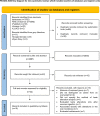Is obesity associated with taste alterations? a systematic review
- PMID: 37334283
- PMCID: PMC10273260
- DOI: 10.3389/fendo.2023.1167119
Is obesity associated with taste alterations? a systematic review
Abstract
Background: Obesity is a growing chronic public health problem. The causes of obesity are varied, but food consumption decisions play an important role, especially decisions about what foods to eat and how much to consume. Food consumption decisions are driven, in part, by individual taste perceptions, a fact that can influence eating behavior and, therefore, body mass.
Methodology: The searches were conducted in the electronic databases PubMed, Web of Science, Scopus, Lilacs, and the grey literature (Google Scholar and Open Grey). The acronym PECO will be used, covering studies with adult humans (P) who have obesity (E) compared to adult humans without obesity (C), having as an outcome the presence of taste alterations (O). After searching, duplicates were removed. The articles were first evaluated by title and abstract, following the inclusion and exclusion criteria; then, the papers were read in full. After the studies were selected, two reviewers extracted the data and assessed the individual risk of bias and control statements for possible confounders and bias consideration. The narrative GRADE system performed the methodological quality assessment using the New Castle Ottawa qualifier and analysis of certainty of evidence.
Results: A total of 3782 records were identified from the database search, of these 19 were considered eligible. Forty percent of the eligible studies show that there was an association between obesity and different taste alterations for different flavors comparing with normal weights adults. In the methodological quality analysis of the nineteen studies, which assesses the risk of bias in the results, fifteen showed good methodological reliability, three showed fair methodological reliability, and one showed low methodological reliability.
Conclusion: Despite methodological limitations, the results of the studies suggest the existence of a association between obesity and taste alterations, but further investigations with more sensitive methodologies are necessary to confirm this hypothesis.
Systematic review registration: https://osf.io/9vg4h/, identifier 9vg4h.
Keywords: humans; obesity; overweight; taste; taste perception.
Copyright © 2023 Peinado, Frazão, Bittencourt, Souza-Rodrigues, Vidigal, da Silva, Paranhos, Magno, Fagundes, Maia and Lima.
Conflict of interest statement
The authors declare that the research was conducted in the absence of any commercial or financial relationships that could be construed as a potential conflict of interest.
Figures
Comment in
-
Commentary: Is obesity associated with taste alterations? a systematic review.Front Endocrinol (Lausanne). 2024 Jan 19;14:1282276. doi: 10.3389/fendo.2023.1282276. eCollection 2023. Front Endocrinol (Lausanne). 2024. PMID: 38313840 Free PMC article. No abstract available.
References
-
- De Azevedo MASB, Spadotto C. Estudo psicológico da obesidade: dois casos clínicos. Temas em Psicologia (2004) 12(2):127–44.
Publication types
MeSH terms
LinkOut - more resources
Full Text Sources
Medical


